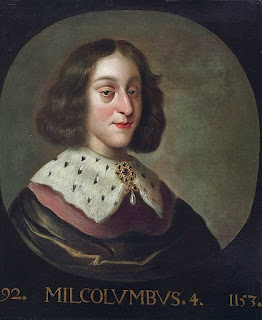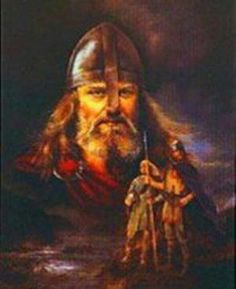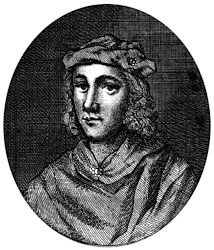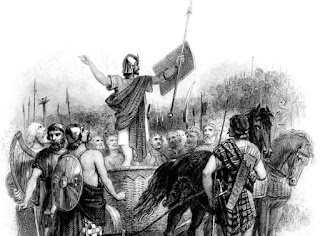Malcolm IV
King Malcolm IV
They called him the Maiden King – a touch unfairly, perhaps – because he was perceived to be more of a monk than a monarch. He was also Scotland's first child king, taking up the throne at the age of 13 and dying at 24 before he had a chance to prove his manhood.
Nevertheless, the reign of Malcolm IV, from 1153 to 1165, earned good contemporary reviews after its relatively seamless continuation of policies and outlook of his grandfather and predecessor David I
Malcolm's father, David I's son Earl Henry, had died tragically and suddenly in his thirties in 1152 while he had been proving himself an equally able successor to his father.
In 1139 Henry had married Ada de Warenne, the daughter of the Earl of Surrey, a leading Anglo-Norman baron. As soon as Earl Henry was dead, David saw to it that Henry's oldest son, Malcolm, then aged 12, was the new king-designate. He handed the boy over to Earl Duncan MacDuff of Fife, the foremost Scottish earl, who, at the head of a large army, took the boy around Scotland north of the Forth and proclaimed him heir to the kingdom.
In the following year, 1153, David I died, at Carlisle (then within his kingdom) and was buried in the new royal mausoleum in Dunfermline. A few days later, Malcolm was crowned at Scone, the ancient place of coronation.
The fact that a 13-year-old boy could become king is a sign of just how much Scotland had changed in the previous 50 years, never before had the nation had an under-age king. It says much for the prestige of David I, and the stable government which he had introduced. Without them, Malcolm would not have survived. However, he did not have an easy time with it. The November of the year of his accession saw the first rebellion and challenge to his authority, when the powerful King of the Western Isles, Somerled, joined forces with the sons of Malcolm son of Heth
Malcolm son of Heth was himself a prisoner in Roxburgh, with a strong claim on the Scottish throne Under the motto of divide and rule, three years later (in 1157) Malcolm IV reconciled himself with Malcolm son of Heth, releasing him from prison after 23 years, and making him Earl of Ross
The same diplomacy is seen in his dealings with his powerful neighbour to the south, Henry Il of England The bitter civil wars in England which hail raged for most of King Stephen's reign (1135 54) were finally settled by the accession of the young and very able Henry II in December 11.54.
In 1157 Henry demanded back Northumberland and Cumbria, both of which had been acquired by David 1. Malcolm IV granted his request. This was expedient, given the far greater power of Henry, who controlled not only England, but much of modern France-though it must have galled many of the Scottish nobility.
When Malcolm went off to southern France in 1159 to support Henry in a local dispute there, was knighted by Henry, and did not return until 1160, discontent in Scotland reached such a pitch that six carls led by Earl Ferteth (Feardach) of Strathearn-besieged the king at Perth shortly after his return. They had no doubt seen Malcolm's dancing attendance on Henry as threatening Scotland's independence as a kingdom and distracting the young king from his duties at home.
This seems to have been the start of a mini civil war, which ended with the king's victory over his enemies in Galloway later that same year. The investment both he and his grandfather had made in building up an effective fighting force, using the latest in European military technology, had paid off. It consisted chiefly of introducing into Scotland aristocratic settlers from Anglo-Norman England, as well as from Normandy, Brittany, and Flanders. These in turn brought with them modern techniques of armour, cavalry and, castle-building, the cutting edge of military know-how, both literally and figuratively.
At the same time, they owed allegiance directly to the king, and could therefore be relied on more than many of the native aristocracy, who often had other loyalties and agendas. It was one of the great political successes of these 12th-century kings of Scots that they were able to do this without causing civil war in their heartland of southern and east-central Scotland.
The presence of these incomers also had a profound effect on the way the king governed his realm. The whole process is generally known as feudalisation' - the idea of land and income in return for military service to the king was not new. What was new, was the quality of this service, and the fact that it was being more exactly defined.
One of the results of this was to introduce another linguistic, ethnic and cultural element into the country which was already polyglot, multi-ethnic, and multicultural. This is most vividly brought out in the way in which King Malcolm addresses his subjects in several of his charters with such phrases as 'French, English, Scots, and Cumbrians (Welsh), sometimes even adding'Galwegians'.
The Scots are the Gaelic-speaking inhabitants of Scotland north of the Forth; the English are chiefly the English-speakers of south-east Scotland, the descendants of the Northumbrians who had settled there 500 years before; while the Cumbrians are the Welsh-speakers of Strathclyde The French, on the other hand, are those new settlers, whose chief language would have been French, whether they came from England or north-west France and the Low Countries.
Alluding to both Malcolm IV and his brother and successor William I, an English chronicler in the early 13th century famously remarked that "the modern kings of Scotland count themselves as Frenchmen in race, manners, language, and culture; they keep only Frenchmen in their and following and have reduced the Scots to utter servitude".
Although a gross over-simplification and exaggeration, it no doubt reflected something of the reality and goes some way towards explaining the rebellions which both Malcolm IV and William had to face. It was some of these 'French' more particularly Flemings from Flanders - whom Malcolm settled in Clydesdale, forming a buffer zone of loyal and well-equipped fighting men between the heart of his kingdom and Galloway, source of so much trouble for the Scottish throne.
Who was actually governing Scotland during the minority of Malcolm IV? His mother, Ada, no doubt took a leading part in this. As we have seen, there was certainly a maturity and diplomacy shown in the early years of Malcolm's reign which went far beyond those of a teenager.
Malcolm is often portrayed as being saintly and unworldly, but we know he was also a soldier, eager to be knighted, who led his armies in several campaigns.
He was nicknamed 'the Maiden' because he is said to have died a virgin. He thus failed in one of the important duties of Medieval kingship - the production of an heir - despite the best efforts of his mother, who, trying to make him 'a king, not a monk', as one chronicler put it, introduced a young woman to his bed. He did not object, but as soon as his had left the room, he slept on the floor, and we are assured that his virginity survived the night.
The chronicler, himself a monk, would have us believe this was because of Malcolm's high-minded virtue, but it may well be that Malcolm was simply not attracted to women, and thus made a virtue out of a necessity.
The 12th century in Scotland was when most of the essential Medieval monasteries were founded, yet for all his pious reputation, Malcolm IV is associated with the foundation of only one, that of Coupar Angus, a daughter house of the great Cistercian abbey of Melrose.
It might be said, however, that his grandfather, David 1, had already saturated the market in this regard, as he was directly responsible for founding no fewer than 13 monasteries and nunneries in his kingdom.
Malcolm died young, and so was fairly unproven as a ruler. But had he lived, he would probably have been an effective and respected king. We see him showing an increasingly firm hand in the governance of his kingdom, tempered by careful diplomacy and a genuine interest in the affairs of the Church, concerned for its independence from the archbishopric of York, which was making strong claims on it.
He suffered from severe ill health towards the end of his short life, and this may have prompted him to plan a pilgrimage to Santiago de Compostella in Spain, a plan he was unable to carry out. He died in December, 1165, aged 24, at Jedburgh, and was buried beside his grandfather David I at Dunfermline.
A contemporary Irish annalist, whom we can assume was less partisan than those writing within Scotland or northern England, sums up his character this way: "With regard to charity and hospitality and piety, he was the best Christian of the Gaels to the east of the sea".
There have been many worse epitaphs of kings than this.
Malcolm IV lived from 1141 to 9 December 1165 and was King of Scotland from 24 May 1153 to 9 December 1165.












Comments
Post a Comment